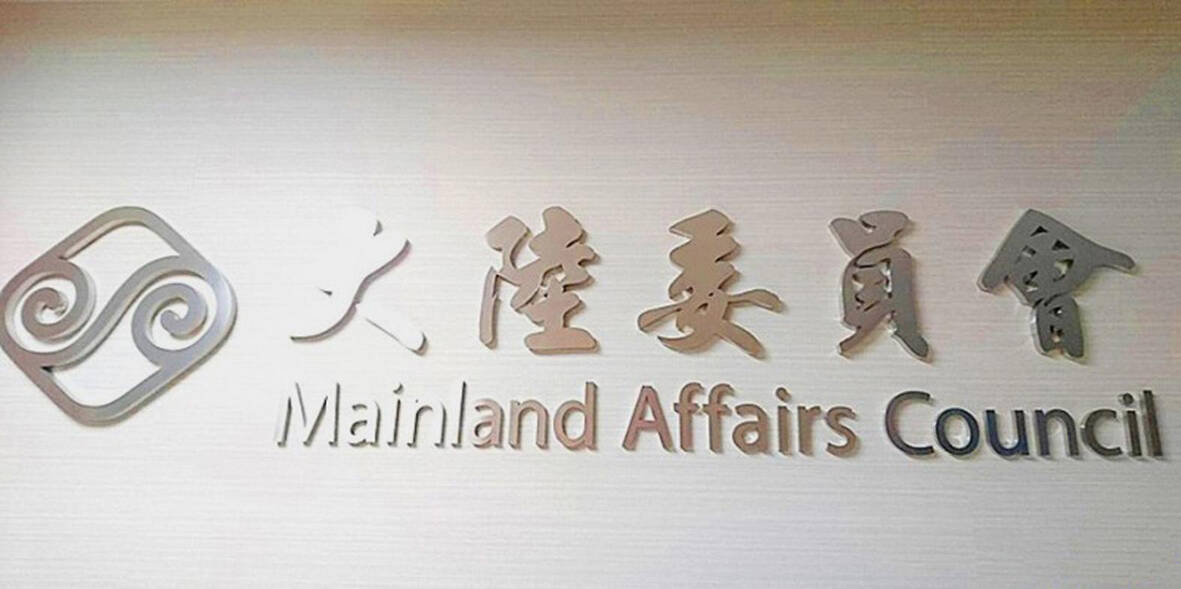The Mainland Affairs Council (MAC) yesterday, for the first time, explicitly branded China’s trade barrier investigation of Taiwan as a move intended to interfere with January’s presidential election.
The Chinese Ministry of Commerce on April 12 announced that it was launching a probe into trade barriers imposed by Taiwan on 2,455 Chinese agricultural products, textiles, coal, minerals, metals, plastics, rubber, chemicals and construction materials.
The announcement was made on the day that Vice President William Lai (賴清德) was nominated by the Democratic Progressive Party as its presidential candidate.

Photo: Chung Li-hua, Taipei Times
A week prior to the announcement, President Tsai Ing-wen (蔡英文) met US House of Representatives Speaker Kevin McCarthy in California after traveling to Guatemala and Belize.
The ministry said that it planned to complete the investigation by Oct. 12, but it could be extended to Jan. 12 next year.
That is the day before Taiwan’s election.
The restrictions on Chinese goods were implemented when Taiwan joined the WTO, and China had voiced no objection over the years, the MAC said.
The sudden launch of the investigation and its time line is clearly politically motivated, the MAC said, adding that it is an obvious attempt to interfere with Taiwan’s election using economic coercion.
Hsu Chia-hao (許家豪), an assistant professor at National Sun Yat-sen University’s Si Wan College, yesterday said that the timing did show Beijing’s determination to influence Taiwan’s elections using economic coercion.
The result of the investigation could be published during the campaign period to sway the election, or it could be used afterward depending on the outcome of the vote, Hsu said.
If the candidate China supports fails to win the election, the investigation could be used by Beijing as “punishment,” he said.
Beijing has tried to win people’s hearts by offering economic and trade benefits since former president Ma Ying-jeou (馬英九) was in power, a strategy that proved unsuccessful during the 2016 and 2020 presidential elections, Hsu said.
China is expected to continue its politically motivated economic coercion against Taiwan, but would focus more on military and diplomatic pressure, he said.
The Chinese Ministry of Commerce on Thursday announced that the number of items under investigation had been adjusted to 2,509.
General Chamber of Commerce chairman Paul Hsu (許舒博) yesterday said that cross-strait tensions could lead to anything, as hostile US-China relations are causing all kinds of problems.
Taiwan and China are important trading partners, he said, adding the two sides should show mutual goodwill and improve relations by communicating more.

MAKING WAVES: China’s maritime militia could become a nontraditional threat in war, clogging up shipping lanes to prevent US or Japanese intervention, a report said About 1,900 Chinese ships flying flags of convenience and fishing vessels that participated in China’s military exercises around Taiwan last month and in January last year have been listed for monitoring, Coast Guard Administration (CGA) Deputy Director-General Hsieh Ching-chin (謝慶欽) said yesterday. Following amendments to the Commercial Port Act (商港法) and the Law of Ships (船舶法) last month, the CGA can designate possible berthing areas or deny ports of call for vessels suspected of loitering around areas where undersea cables can be accessed, Oceans Affairs Council Minister Kuan Bi-ling (管碧玲) said. The list of suspected ships, originally 300, had risen to about

DAREDEVIL: Honnold said it had always been a dream of his to climb Taipei 101, while a Netflix producer said the skyscraper was ‘a real icon of this country’ US climber Alex Honnold yesterday took on Taiwan’s tallest building, becoming the first person to scale Taipei 101 without a rope, harness or safety net. Hundreds of spectators gathered at the base of the 101-story skyscraper to watch Honnold, 40, embark on his daredevil feat, which was also broadcast live on Netflix. Dressed in a red T-shirt and yellow custom-made climbing shoes, Honnold swiftly moved up the southeast face of the glass and steel building. At one point, he stepped onto a platform midway up to wave down at fans and onlookers who were taking photos. People watching from inside

Japan’s strategic alliance with the US would collapse if Tokyo were to turn away from a conflict in Taiwan, Japanese Prime Minister Sanae Takaichi said yesterday, but distanced herself from previous comments that suggested a possible military response in such an event. Takaichi expressed her latest views on a nationally broadcast TV program late on Monday, where an opposition party leader criticized her for igniting tensions with China with the earlier remarks. Ties between Japan and China have sunk to the worst level in years after Takaichi said in November that a hypothetical Chinese attack on Taiwan could bring about a Japanese

The WHO ignored early COVID-19 warnings from Taiwan, US Deputy Secretary of Health and Human Services Jim O’Neill said on Friday, as part of justification for Washington withdrawing from the global health body. US Secretary of State Marco Rubio on Thursday said that the US was pulling out of the UN agency, as it failed to fulfill its responsibilities during the COVID-19 pandemic. The WHO “ignored early COVID warnings from Taiwan in 2019 by pretending Taiwan did not exist, O’Neill wrote on X on Friday, Taiwan time. “It ignored rigorous science and promoted lockdowns.” The US will “continue international coordination on infectious